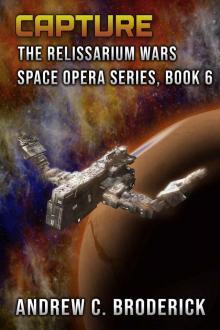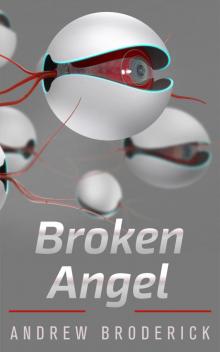- Home
- Andrew C Broderick
Zara's Flight: Book One of the Kato's War series Page 5
Zara's Flight: Book One of the Kato's War series Read online
Page 5
“I’m still trying to decide.” The evening was warm and silky, as the waterfront lights came on. Cigarette smoke hung in the air as pieces of conversations drifted over. “I could just stay here and become an Egyptologist,” Zara joked.
“If that’s what you want to do… there’s absolutely nothing stopping you. Why you looking at me like that? I’m serious!”
Zara didn’t know German, Polish, French, or Egyptian, but she knew the word TAON when she heard it.
“I’ve heard my dad’s company mentioned no less than three times in the last five minutes,” she said. “See that guy over there? Count Von… whatever. He said it. I know it’s a big company and all, but that’s just weird.”
Zara pulled out her jewel-encrusted phone and saw the headline: WORLD MARKETS CRASH ON TAON FEARS. Raising her eyebrows, she clicked it. A talking-head female anchor said: “World stock markets are plummeting tonight on fears of an economic recession brought about by the widespread failure of shape-shifting robots. US-based TAON Incorporated’s stock has dropped eleven percent in this morning’s trading…”
“Whoa! This sounds pretty serious!” Zara said, taken aback. She held the phone up so Mikayla could also see it. “…joining me in the studio is robotics market analyst Jeff Stein, from Goldman Sachs. Jeff, what do you make of this?”
A gray-suited man shifted uncomfortably in his chair. He was clearly much better at analysis than being in front of a camera. “Well, Jane, there is indeed a widespread failure of shape-shifting robots. That much is clear. The markets are spooked because so much of our economy—our lives, even—depend on them. Manufacturing has flocked back to the US in recent years because it’s now just as cheap to manufacture things here as overseas. Seventy percent of all items are now assembled at least in part by shape-shifters. Countless factories and other businesses could be shut down, causing incalculable economic damage.”
“Thank you, Jeff,” Jane said. She looked back at the camera. “At present, the problems with this technology appear to be more prevalent in the US than Asia, where more companies have bought robots from MX9 Robotics and several smaller competitors. Their products appear to be unaffected…”
“Wow…” Zara said. “This looks serious!”
“It sure does,” Mikayla said, looking perplexed.
The next morning, Zara awoke to a text message from Martin:
Zara, come home. This could be the catalyst to the economic megaquake that people have been worrying about for years. The State Dept. is advising all US nationals to leave politically unstable regions—such as Egypt. Get yourselves to the airport. If all the flights are full, book a private plane. I’ll pay for it if need be. Love, Grandpa.
“Ugh.”
“What?” Mikayla asked.
Zara read her the message. “He’s totally overreacting,” Zara continued.
“Well, think about it from his point of view. I know that’s difficult for you”—Mikayla said this last part with irritation—“but he lost his daughter-in-law, and then his son. He doesn’t want to lose you, too.”
Several days later, Zara strolled despondently west from Central Park, along Sixtieth Street, with her hands in her pockets. The wind whipped around her. Vacation over. Back to reality. But, what reality? The streets were brutally cold in winter. Anna-Nicole and Mikayla were both at school. Zara was cutting class from her fine arts degree. She had started with great enthusiasm, only to lose focus as recent events had unfolded. She would rather walk and introspect than go to class.Zara stopped at the corner of Sixtieth and Columbus. She looked around, and up at the enormous, imposing stone façade of the Church of Saint Paul the Apostle, with its arched doorways and windows. Her breath condensed before her and blew away in wisps. What if she went into the church? She’d never been in a church before, apart from visiting cathedrals as a tourist. Who would be in there? What was it like?
Zara crossed the street, ascended the steps, and pulled open the great front door. Closing it behind her, she found herself in a world of stifling quiet—the kind you get in a library. She was in a lobby, the front of which was glass. It gave a view into the huge sanctuary. Zara peered in. Enormous stone columns, supporting arches, lined the sides. Great chandeliers hung above the pews. Only a few parishioners were there, kneeling in prayer, in the middle of the afternoon. Zara entered. She held her breath, lest she make a noise. The door closed silently behind her. She soaked in the atmosphere, marveling at the grand and ornate hall of worship.
“Welcome, child.” The kindly words came from an elderly black-robed priest to her left. Zara’s heart jumped out of her chest for a second. “I’m sorry, I didn’t mean to startle you,” he said.
“That’s okay.” Zara caught her breath.
“You’re welcome to pray or just look around.”
“Thanks,” Zara whispered. What should she do? How was she supposed to act in here? She gulped and looked at the floor.
“Father Frederick, at your service.” He stretched out a wizened hand. Zara shook it weakly. “Do you need spiritual solace of any kind?”
“Well, I don’t know… you see, I… my dad…”
“Come,” Father Frederick beckoned gently. He led Zara to the very front of the sanctuary, past the altar, and then left into an ornate room, probably a vestry. He pulled up a folding chair and offered another to Zara. She sat down. She would never have even thought about doing this, ordinarily. Why was she here?
“What’s on your mind, child?” Child? She hadn’t been a child for… well, maybe she was still one inside… Father Frederick seemed peaceful and safe.
“I’m… Zara…” she began.
“I know,” Father Frederick said.
“But… my disguise?”
“It only covers the physical face.” What? Was this guy also a soothsayer? No point in hiding anymore. She removed her disguise and shook her head. Her long hair swished.
“I just hurt so much…” Zara began. Hot tears already began to form. The whole tale of her inner sorrow began to pour out. Mom. Dad. Loneliness. Fear. And oh, the relief, as she unburdened her soul. Father Frederick just listened. His ears must have heard thousands of tales of grief. He nodded sympathetically. What would he say now? Zara had never told anybody how she truly felt. Not even her best friends. Father Frederick offered Zara a tissue, which she gratefully accepted. She wiped her eyes and face.
There was silence for a long moment. “Do you love your father?” he asked.
“Of course! More than anybody!” Why would he ask this?
“Then you need to forgive him.”
“Forgive him?”
The old priest nodded slowly. The gentleness and wisdom of years radiated from him. “To hold onto your bitterness won’t change anything that’s happened. It won’t bring your mother back. It’s like holding a cup of poison, and waiting for the other person to drink it. Well, he won’t.”
“But… why shouldn’t I be angry?!” Zara’s face burned, and her jaw clenched.
The Father held up a hand as if to stop her. There was now a slight sternness in his voice. “You’re right. He doesn’t deserve your forgiveness. But, you’ll just burden your soul for the rest of your life until you can let go of your anger. You’re not doing it for him, you’re doing it for you.” For me? For me…
Zara looked into Father Frederick’s eyes. He can see through my soul. I just know it. And yet… Zara looked away.
Silence ensued. “Thanks, Father,” Zara said. Rain poured inside of her. And yet… there was also a rainbow.
“You’re most welcome.”
Zara said her goodbyes, got up, walked back through the sanctuary, and out of the church. Back across the street. She strode, purposefully now, through Central Park. Cold? What cold?
Forgiveness. She hadn’t exactly been the perfect daughter, either. The rebellion, anger, and rejection she had given Kato through her tumultuous teenage years. How many tears had he shed behind closed doors?
Zara stopped dead.
I forgive you, Dad. Why? Because I choose to. That’s all.
Chapter 16
Kato’s sleep was restless as he sped away into the cold blackness of deep space. Microgravity was better for sleep than the best comfort mattress on Earth but, for the first time in years, he had had a nightmare. A snake coiled itself slowly around him. Kato had a flashback to his childhood when his cousins had all sat on him, squashing him until he couldn’t breathe. The snake slowly exerted its pressure, constricting over several agonizing minutes. It seemed to enjoy the pain and suffering of its victim, having neither conscience nor compassion.
As Kato began to lose consciousness, the snake raised its sleek head so it was level with his. Its soulless eyes were slits that conveyed only evil, and its forked tongue flicked rapidly as it hissed softly. He couldn’t avoid its gaze. Kato’s eyesight reduced to a narrow tunnel as his brain was starved of oxygen.
Kato awoke with a scream, bumping his head painfully on the ceiling of his cabin. He clenched his hands to his throat and let out a huge sigh of relief on finding that there was no snake. It was only a dream. He was drenched in sweat and his heart was pounding.
Then a cold, prickly sensation covered Kato’s body from head to toe, overshadowing the pain from the rapidly growing goose egg on his head. The dream had not been random. His brain was trying to tell him something. Kato had been so caught up in trying to solve the nanorobotics defect in the past two days that he had overlooked something that sickened him to the core: his oxygen recycling system was a hybrid of biology and nanorobotics. All TAON products will eventually fail. The alert about the system’s diminishing efficiency made perfect sense now. He had no backup system or any equipment on board to build another one. My clock will run out in mere years, not decades. I’m a dead man.
TAON was in an uproar. Chiefs and generals fired off orders to try to contain the crisis. The stock continued to fall, and the fear of economic doom and uncertainty gripped the nation. Congressional hearings were being held, and it was now certain that Orson, and perhaps James, would be in the hot seat.
James and Randall burned the midnight oil at a workstation in an open area of the basement, having, for now, given up the comforts of their plush offices.
“I’ve scrolled back through our entire version control system,” Randall said, “and I can’t figure out when the offending change was made to the module recycler code.”
“This system only goes back four years,” James said. “The system before that covers the previous three years, but it’s offline. We’ll have to have the backups loaded to see the history. Get Colin to do it now.” The phone call was made, and the backed-up data was loaded half an hour later.
“Damn the progress made with version control,” Randall muttered. “If they hadn’t kept coming out with better systems, we’d have just kept the one we had all along.”
“I did try to tell them…” James said.
“You should have forced the issue,” Randall snapped. “Then we could have avoided exactly this kind of problem. The CTO’s job is to make sure all this kind of crap runs smoothly. But, finger pointing isn’t going to help now.” He paused and took a deep breath. “Okay… let’s keep going back through the history. Various users have touched the file, including you… but, nobody’s changed those lines.”
James leaned back in his chair, arms folded, clearly on the defensive. “Then we have to go back to the system before that. We had that for five years.”
Randall sighed. “Another backup to load. I’ll make the call…” They had another cup of coffee as night began to turn into morning. Even the slightest sound seemed amplified as they grew more tired. Conversation was awkward and minimal. The oppressive light and buzz of the fluorescents bore down on them.
Once the data was loaded, the analysis continued. An hour later, the frustrated men had turned up nothing. James hurled a three-hole punch across the room in frustration. Luckily, nobody else had shown up for work yet. Previous version controls systems were loaded and analyzed as the search continued through the strata of TAON’s history.
“Alright. This is the last one to check,” Randall said, exhausted and exasperated. “This is the first one we ever used: look at its archaic interface! I was actually glad to get rid of this thing. Let’s plow on till the bitter end.” Thousands of lines of code changes flicked past as they went back in time almost to the metaphorical Big Bang.
They were almost ready to give up and convene a meeting of all engineers to figure out the best way to attack the problem, when Randall saw it. “Look! Lines 1,405 to 1,410, committed February 25th, at 6:13 p.m. Username: SYI. Seung Yi. SEUNG YI!” They looked at each other in disbelief.
“Surely not…” James said. “I mean, he couldn’t have…”
“That was about three days before he left,” Randall said. “He planted a time bomb that he knew wouldn’t blow up until years later. A virus, effectively. Oh, my God…” He paused as they tried to wrap their minds around it. “Nobody checked his work. It never even occurred to us. The dirty bastard!”
“Un-goddamned-real,” James replied, aghast. “He hobbled our technology and then stole it. We survived the first punch—him selling our stuff. But I don’t think we’re going to survive this one. But, at least we now know why—and who.”
Randall buried his head in his hands. “This information changes everything. But, what on earth are we going to do?”
“I dunno, buddy. We’d better let Orson sort that one out. At best, this is the biggest case of corporate sabotage in history. At worst… it’s economic terrorism.”
“Say it isn’t so, man,” a panicked James said, in a message to Kato three hours later. “I just realized what all this is gonna mean for you. You said you had nanorobotics in your life support system. And, get this: we have proof that Seung’s responsible. He planted a bomb under all of us and lit the fuse. It’s taking TAON down. Please tell me you have a workstation up there and enough raw materials you can use to rebuild your life support system.” He stopped recording and pressed send.
The message shot out into space, mere radio waves, conveying bits, conveying emotion.
Two hours later, the reply came across the interplanetary gulf from a weary-looking Kato: “It’s true. I never brought a workstation, because I thought the self-healing capabilities of our systems were foolproof. They’ve been working so well for so many years. As for Seung’s part… we probably shouldn’t be surprised, looking back on it: the guy turns up out of nowhere, with stolen IP, and then disappears again a few months later, having stolen our IP.
“Oh, and if you’re wondering: the O2 recycling system is projected to fail in about three years. It’ll be partially functional until then. At that point, I’ll have about another five years left in the reserves. Do the math.”
Chapter 17
Zara couldn’t quite tell where the waters of Lake Washington ended and the sky began. As she looked at the horizon, from her grandparents’ huge deck ten meters above the lake, water and air met in a shimmering blue haze as the midday summer sun beat down.
Distant boats’ sails and masts disappeared into the haze and, somewhere above, were reflected as a mirage, devoid of shape but containing the same colors. A jet, high above, carved its contrail across the sky, and she watched its reflection in the almost glass-smooth water.
Next to her sat Kinuko, wearing a tank top and baggy knee-length jean shorts, and next to Kinuko sat Martin, wearing a short-sleeve button-up shirt and dark brown cargo shorts. Though they could see many people making the most of a rare sunny day, their mood was anything but joyful.
“There isn’t really any hope, is there, Grandma?” Zara asked.
Kinuko sighed. “I’m afraid not, dear. He’s far beyond the reach of any possible rescue mission and going much too fast to turn around.”
“He gambled everything on his technology and lost,” Martin growled. “That recycler should have been tested for years before being used so far from Earth.”
“He’s not… he’s not going to die soon, though, is he? I mean, his air’ll last a while, right?” Zara asked, her face conveying her fear.
“Yes,” Martin said. “It’s not gone yet, but the system’s not even gonna last a quarter of its design lifetime. I don’t even want to think about it.”
They let the subject drop. Kinuko reached out and took Zara’s hand. Zara sighed, and a tear ran down her left cheek. They just sat in silence for several minutes, looking out at the lake.
“Grandma, can I move in with you guys for a while?”
“Of course, dear! You’re welcome any time. You know that.”
“Thanks,” Zara said. “I just feel like New York’s too dangerous. There’s too big of a backlash against TAON. Somebody might want revenge or something.”
Martin nodded. “I had been thinking that same thing, actually. If you had wanted to stay there, I would have hired extra protection for you and insisted that you accept it, young lady!” He managed a small smile and a wink. Zara knew that underneath his gruff exterior was a deep, undying love for all his family. She smiled back.
The temperature was a pleasant seventeen degrees Celsius as Zara looked down the road outside Kalgoorlie, Western Australia. It was a divided highway that cut a straight path west to who knows where. On either side was brown, scrubby desert. Small groups of trees had taken root here and there in that arid place, wherever traces of water could be found.
She walked ten meters to the right of the road, down an embankment, out of view of the traffic. Crucially for Zara, next to the road was railway track. A freight train, so long that she could see neither the back nor front from where she stood, had come to a halt. She easily climbed the fence and dropped down the other side. After a quick look in both directions, she jumped into a car carrying lumber, whose door had been left open on that side. The other side was also open, but the view was blocked by a two-meter-high pile of planks on the right-hand side. The left side of the car was her temporary home, and she sat down on the dusty floor with her back against the end wall of the car. She could see the highway outside and hoped that no one driving along the road would notice her.

 The Relissarium Wars Omnibus
The Relissarium Wars Omnibus Blood Red: The Relissarium Wars Space Opera Series, Book 2
Blood Red: The Relissarium Wars Space Opera Series, Book 2 The Cosmic Bullet: The Enigma Series, Part One
The Cosmic Bullet: The Enigma Series, Part One Zara's Flight: Book One of the Kato's War series
Zara's Flight: Book One of the Kato's War series Annihilation: The Relissarium Wars Space Opera Series, Book 1
Annihilation: The Relissarium Wars Space Opera Series, Book 1 Blood Red
Blood Red The Lost Colony Series: Omnibus Edition: All Four Volumes in One
The Lost Colony Series: Omnibus Edition: All Four Volumes in One Kato's War: Book Two of the Kato's War series
Kato's War: Book Two of the Kato's War series Capture: The Relissarium Wars Space Opera Series, Book 6
Capture: The Relissarium Wars Space Opera Series, Book 6 Destination: Earth: The Enigma Series, Part Three
Destination: Earth: The Enigma Series, Part Three Kato's War
Kato's War Broken Angel
Broken Angel Firestorm: The Relissarium Wars Space Opera Series, Book 4
Firestorm: The Relissarium Wars Space Opera Series, Book 4 Missing: The Lost Colony Series, Part One
Missing: The Lost Colony Series, Part One